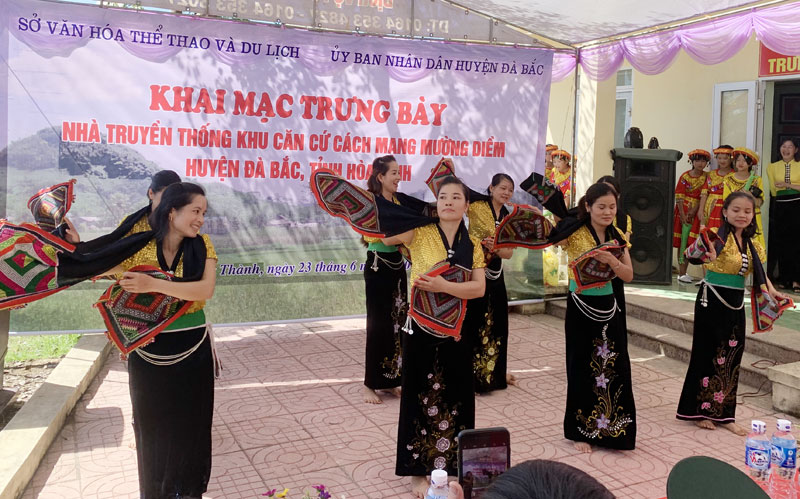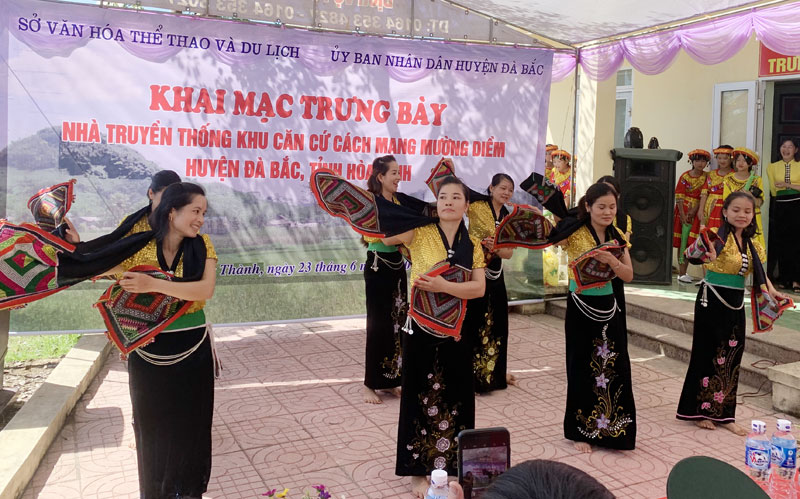
(HBO) - The teams of the arts performance at the grassroot levels have been increasingly invested, meeting the needs of enjoying the spiritual culture of the people

Preserving the national culture.
The
movement of the mass culture has been widely developed in hamlets, villages,
and residential areas, being increasingly improved in the quality. Currently,
there are art performance teams in 100% of the villages, the hamlets and the
residential areas in the province. They regularly have meetings and practise to
have new, interesting and attractive performances during holidays, New Year and
the anniversaries of the locality and the country. Many teams have actively
been purchasing more costumes, props and musical instruments for practice and
performance from the socialized sources.
The
activities of the grassroots performance teams not only enrich the spiritual
life of the people, effectively serve the local political tasks, but they also
transmit the traditional culture and education to the young generation so that
they can understand and love the traditional culture of the nation.
Additionally, many localities, associations and unions have set up cultural
clubs, the clubs conserving the folklore culture to meet the needs of the
cultural enjoyment and to create a healthy entertainment playground for the
people.
In addition
to the practice to perform the modern art repertoire, the performance teams
have also been paying special attention to preserving and promoting the
traditional cultural values of the nation through folk songs, folk dance and
ethnic musical tools. At the community tourism villages, there are 2-3
performance teams to serve tourists when they pay a visit and are on vacation
there. Ms. Ly Sao Mai from the art team of Sung vilage, Cao Son commune (Da
Bac) says: As a community tourism village, we regularly welcome international
delegations to visit and relax. In addition to exploring the natural landscape,
the cuisine and the traditional culture of the Dao ethnic group, visitors can
also enjoy many unique cultural performances of Dao ethnic people. They are
very excited to see and also dance with us. This is our driving force, joy and
pride in making a small contribution to preserving the national culture, making
the culture of Dao ethnic people (Da Bac) closer to international friends.
With an increasingly vibrant and widespread emulation movement aimed at building cultured residential areas and cultured families, Yen Thuy District has been making steady progress toward improving both the material and spiritual well-being of its people, while fostering a civilized, prosperous, beautiful, and progressive community.
Once lacking recreational spaces and community facilities, Residential Group 2 in Quynh Lam Ward (Hoa Binh City) has recently received attention for the construction of a new, spacious, and fully equipped cultural house. The project followed the model of state support combined with public contributions in both labor and funding.
The "All people unite to build cultural life" movement, which has been effectively integrated with Kim Boi district’s socio-economic development goals, is fostering a lively spirit of emulation across local residential areas, hamlets, villages, public agencies, and enterprises. In addition, through the initiative, traditional cultural values are being preserved and promoted, while community solidarity and mutual support in poverty reduction and economic development are being strengthened.
A working delegation of the Hoa Binh provincial People’s Committee led by its Permanent Vice Chairman Nguyen Van Toan on June 11 inspected the progress of a project to build the Mo Muong Cultural Heritage Conservation Space linked to tourism services in Hop Phong commune, Cao Phong district.
Born and growing in the heroic land of Muong Dong, Dinh Thi Kieu Dung, a resident in Bo town of Kim Boi district, in her childhood was nurtured by the sweet lullabies of her grandmother and mother. These melodies deeply imprinted on her soul, becoming an inseparable part of her love for her ethnic group's culture. For over 20 years, this love for her hometown has driven Dung to research, collect, and pass down the cultural values of the Muong people to future generations.
In the final days of May, the Ethnic Art Troupe of Hoa Binh Province organized performances to serve the people in remote, mountainous, and particularly disadvantaged areas within the province. These were not just ordinary artistic shows, but they were the meaningful journeys aimed at spreading cultural values, enhancing the spiritual life of the people and contributing to the preservation of ethnic minority cultural identities.



